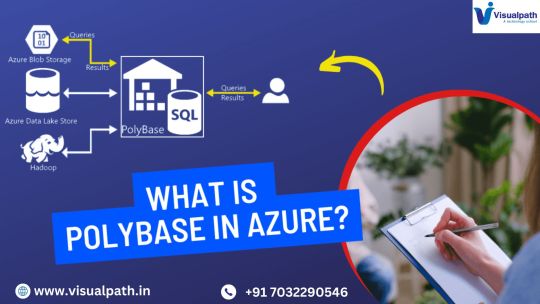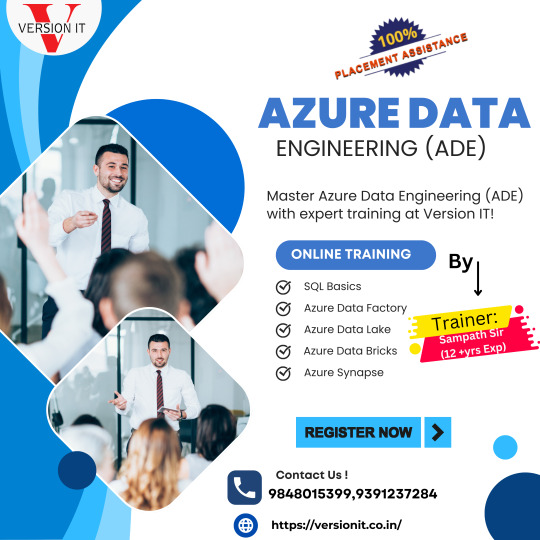#online azure data engineering
Explore tagged Tumblr posts
Text
Real-time Data Processing with Azure Stream Analytics
Introduction
The current fast-paced digital revolution demands organizations to handle occurrences in real-time. The processing of real-time data enables organizations to detect malicious financial activities and supervise sensor measurements and webpage user activities which enables quicker and more intelligent business choices.
Microsoft’s real-time analytics service Azure Stream Analytics operates specifically to analyze streaming data at high speed. The introduction explains Azure Stream Analytics system architecture together with its key features and shows how users can construct effortless real-time data pipelines.
What is Azure Stream Analytics?
Algorithmic real-time data-streaming functions exist as a complete serverless automation through Azure Stream Analytics. The system allows organizations to consume data from different platforms which they process and present visual data through straightforward SQL query protocols.
An Azure data service connector enables ASA to function as an intermediary which processes and connects streaming data to emerging dashboards as well as alarms and storage destinations. ASA facilitates processing speed and immediate response times to handle millions of IoT device messages as well as application transaction monitoring.
Core Components of Azure Stream Analytics
A Stream Analytics job typically involves three major components:
1. Input
Data can be ingested from one or more sources including:
Azure Event Hubs – for telemetry and event stream data
Azure IoT Hub – for IoT-based data ingestion
Azure Blob Storage – for batch or historical data
2. Query
The core of ASA is its SQL-like query engine. You can use the language to:
Filter, join, and aggregate streaming data
Apply time-window functions
Detect patterns or anomalies in motion
3. Output
The processed data can be routed to:
Azure SQL Database
Power BI (real-time dashboards)
Azure Data Lake Storage
Azure Cosmos DB
Blob Storage, and more
Example Use Case
Suppose an IoT system sends temperature readings from multiple devices every second. You can use ASA to calculate the average temperature per device every five minutes:

This simple query delivers aggregated metrics in real time, which can then be displayed on a dashboard or sent to a database for further analysis.
Key Features
Azure Stream Analytics offers several benefits:
Serverless architecture: No infrastructure to manage; Azure handles scaling and availability.
Real-time processing: Supports sub-second latency for streaming data.
Easy integration: Works seamlessly with other Azure services like Event Hubs, SQL Database, and Power BI.
SQL-like query language: Low learning curve for analysts and developers.
Built-in windowing functions: Supports tumbling, hopping, and sliding windows for time-based aggregations.
Custom functions: Extend queries with JavaScript or C# user-defined functions (UDFs).
Scalability and resilience: Can handle high-throughput streams and recovers automatically from failures.
Common Use Cases
Azure Stream Analytics supports real-time data solutions across multiple industries:
Retail: Track customer interactions in real time to deliver dynamic offers.
Finance: Detect anomalies in transactions for fraud prevention.
Manufacturing: Monitor sensor data for predictive maintenance.
Transportation: Analyze traffic patterns to optimize routing.
Healthcare: Monitor patient vitals and trigger alerts for abnormal readings.
Power BI Integration
The most effective connection between ASA and Power BI serves as a fundamental feature. Asustream Analytics lets users automatically send data which Power BI dashboards update in fast real-time. Operations teams with managers and analysts can maintain ongoing key metric observation through ASA since it allows immediate threshold breaches to trigger immediate action.
Best Practices
To get the most out of Azure Stream Analytics:
Use partitioned input sources like Event Hubs for better throughput.
Keep queries efficient by limiting complex joins and filtering early.
Avoid UDFs unless necessary; they can increase latency.
Use reference data for enriching live streams with static datasets.
Monitor job metrics using Azure Monitor and set alerts for failures or delays.
Prefer direct output integration over intermediate storage where possible to reduce delays.
Getting Started
Setting up a simple ASA job is easy:
Create a Stream Analytics job in the Azure portal.
Add inputs from Event Hub, IoT Hub, or Blob Storage.
Write your SQL-like query for transformation or aggregation.
Define your output—whether it’s Power BI, a database, or storage.
Start the job and monitor it from the portal.
Conclusion
Organizations at all scales use Azure Stream Analytics to gain processing power for real-time data at levels suitable for business operations. Azure Stream Analytics maintains its prime system development role due to its seamless integration of Azure services together with SQL-based declarative statements and its serverless architecture.
Stream Analytics as a part of Azure provides organizations the power to process ongoing data and perform real-time actions to increase operational intelligence which leads to enhanced customer satisfaction and improved market positioning.
#azure data engineer course#azure data engineer course online#azure data engineer online course#azure data engineer online training#azure data engineer training#azure data engineer training online#azure data engineering course#azure data engineering online training#best azure data engineer course#best azure data engineer training#best azure data engineering courses online#learn azure data engineering#microsoft azure data engineer training
0 notes
Text
Azure Data Engineer Course In Bangalore | Azure Data
PolyBase in Azure SQL Data Warehouse: A Comprehensive Guide
Introduction to PolyBase
PolyBase is a technology in Microsoft SQL Server and Azure Synapse Analytics (formerly Azure SQL Data Warehouse) that enables querying data stored in external sources using T-SQL. It eliminates the need for complex ETL processes by allowing seamless data integration between relational databases and big data sources such as Hadoop, Azure Blob Storage, and external databases.
PolyBase is particularly useful in Azure SQL Data Warehouse as it enables high-performance data virtualization, allowing users to query and import large datasets efficiently without moving data manually. This makes it an essential tool for organizations dealing with vast amounts of structured and unstructured data. Microsoft Azure Data Engineer

How PolyBase Works
PolyBase operates by creating external tables that act as a bridge between Azure SQL Data Warehouse and external storage. When a query is executed on an external table, PolyBase translates it into the necessary format and fetches the required data in real-time, significantly reducing data movement and enhancing query performance.
The key components of PolyBase include:
External Data Sources – Define the external system, such as Azure Blob Storage or another database.
File Format Objects – Specify the format of external data, such as CSV, Parquet, or ORC.
External Tables – Act as an interface between Azure SQL Data Warehouse and external data sources.
Data Movement Service (DMS) – Responsible for efficient data transfer during query execution. Azure Data Engineer Course
Benefits of PolyBase in Azure SQL Data Warehouse
Seamless Integration with Big Data – PolyBase enables querying data stored in Hadoop, Azure Data Lake, and Blob Storage without additional transformation.
High-Performance Data Loading – It supports parallel data ingestion, making it faster than traditional ETL pipelines.
Cost Efficiency – By reducing data movement, PolyBase minimizes the need for additional storage and processing costs.
Simplified Data Architecture – Users can analyze external data alongside structured warehouse data using a single SQL query.
Enhanced Analytics – Supports machine learning and AI-driven analytics by integrating with external data sources for a holistic view.
Using PolyBase in Azure SQL Data Warehouse
To use PolyBase effectively, follow these key steps:
Enable PolyBase – Ensure that PolyBase is activated in Azure SQL Data Warehouse, which is typically enabled by default in Azure Synapse Analytics.
Define an External Data Source – Specify the connection details for the external system, such as Azure Blob Storage or another database.
Specify the File Format – Define the format of the external data, such as CSV or Parquet, to ensure compatibility.
Create an External Table – Establish a connection between Azure SQL Data Warehouse and the external data source by defining an external table.
Query the External Table – Data can be queried seamlessly without requiring complex ETL processes once the external table is set up. Azure Data Engineer Training
Common Use Cases of PolyBase
Data Lake Integration: Enables organizations to query raw data stored in Azure Data Lake without additional data transformation.
Hybrid Data Solutions: Facilitates seamless data integration between on-premises and cloud-based storage systems.
ETL Offloading: Reduces reliance on traditional ETL tools by allowing direct data loading into Azure SQL Data Warehouse.
IoT Data Processing: Helps analyze large volumes of sensor-generated data stored in cloud storage.
Limitations of PolyBase
Despite its advantages, PolyBase has some limitations:
It does not support direct updates or deletions on external tables.
Certain data formats, such as JSON, require additional handling.
Performance may depend on network speed and the capabilities of the external data source. Azure Data Engineering Certification
Conclusion
PolyBase is a powerful Azure SQL Data Warehouse feature that simplifies data integration, reduces data movement, and enhances query performance. By enabling direct querying of external data sources, PolyBase helps organizations optimize their big data analytics workflows without costly and complex ETL processes. For businesses leveraging Azure Synapse Analytics, mastering PolyBase can lead to better data-driven decision-making and operational efficiency.
Implementing PolyBase effectively requires understanding its components, best practices, and limitations, making it a valuable tool for modern cloud-based data engineering and analytics solutions.
For More Information about Azure Data Engineer Online Training
Contact Call/WhatsApp: +91 7032290546
Visit: https://www.visualpath.in/online-azure-data-engineer-course.html
#Azure Data Engineer Course#Azure Data Engineering Certification#Azure Data Engineer Training In Hyderabad#Azure Data Engineer Training#Azure Data Engineer Training Online#Azure Data Engineer Course Online#Azure Data Engineer Online Training#Microsoft Azure Data Engineer#Azure Data Engineer Course In Bangalore#Azure Data Engineer Course In Chennai#Azure Data Engineer Training In Bangalore#Azure Data Engineer Course In Ameerpet
0 notes
Text
Why Learning Microsoft Azure Can Transform Your Career and Business
Microsoft Azure is a cloud computing platform and service created by Microsoft. It offers a comprehensive array of cloud services, including computing, analytics, storage, networking, and more. Organizations utilize Azure to build, deploy, and manage applications and services through data centers managed by Microsoft.
Why Choose Microsoft Azure?
Microsoft Azure stands out as a leading cloud computing platform, providing businesses and individuals with powerful tools and services.
Here are some reasons why it’s an excellent choice:
Scalability
Easily add or reduce resources to align with your business growth.
Global Reach
Available in over 60 regions, making it accessible around the globe.
Cost-Effective
Only pay for what you use, with flexible pricing options.
Strong Security
Safeguard your data with enterprise-level security and compliance.
Seamless Microsoft Integration
Integrates smoothly with Office 365, Dynamics 365, and hybrid environments.
Wide Range of Services
Covers everything from Infrastructure (IaaS), Platforms (PaaS), and Software as a Service (SaaS) to advanced AI and IoT tools.
Developer-Friendly
Supports tools like Visual Studio, GitHub, and popular programming languages.
Reliable Performance
Guarantees high availability and robust disaster recovery.
AI and IoT
Create intelligent applications and leverage edge computing for smarter solutions.
Open-Source Friendly
Works well with various frameworks and open-source technologies.
Empower Your Business
Azure provides the flexibility to innovate, scale globally, and maintain competitiveness—all backed by reliable and secure cloud solutions.
Why Learn Microsoft Azure?
Boost Your Career
Unlock opportunities for in-demand roles such as Cloud Engineer or Architect.
Obtain recognized certifications to enhance your visibility in the job market.
Help Your Business
Reduce expenses by crafting efficient cloud solutions.
Automate processes to increase productivity and efficiency.
Create Amazing Apps
Easily develop and deploy web or mobile applications.
Utilize Azure Functions for serverless architecture and improved scalability.
Work with Data
Handle extensive data projects using Azure's robust tools.
Ensure your data remains secure and easily accessible with Azure Storage.
Dive into AI
Develop AI models and train them using Azure Machine Learning.
Leverage pre-built tools for tasks like image recognition and language translation.
Streamline Development
Accelerate software delivery with Azure DevOps pipelines.
Automate the setup and management of your infrastructure.
Improve IT Systems
Quickly establish virtual machines and networks.
Integrate on-premises and cloud systems to enjoy the best of both environments.
Start a Business
Launch and grow your startup with Azure’s adaptable pricing.
Utilize tools specifically designed for entrepreneurs.
Work Anywhere
Empower remote teams with Azure Virtual Desktop and Teams.
Learning Azure equips you with valuable skills, fosters professional growth, and enables you to create meaningful solutions for both work and personal projects.
Tools you can learn in our course
Azure SQL Database
Azure Data Lake Storage
Azure Databricks
Azure Synapse Analytics
Azure Stream Analytics
Global Teq’s Free Demo Offer!
Don’t Miss Out!
This is your opportunity to experience Global Teq’s transformative technology without any commitment. Join hundreds of satisfied clients who have leveraged our solutions to achieve their goals.
Sign up today and take the first step toward unlocking potential.
Click here to register for your free demo now!
Let Global Teq partner with you in driving innovation and success.
0 notes
Text

VisualPath provides a premium Azure Data Engineer Course with expert-led sessions tailored for global learners. Our Azure Data Engineering Certification program features daily recordings, presentations, and hands-on training for an in-depth experience. Enroll now for a free demo session and elevate your skills. Contact us at +91-9989971070 for more details
WhatsApp: https://www.whatsapp.com/catalog/919989971070/
Visit Blog: https://visualpathblogs.com/Visit: https://www.visualpath.in/online-azure-data-engineer-course.html
#Azure Data Engineer Course#Azure Data Engineering Certification#Azure Data Engineer Training In Hyderabad#Azure Data Engineer Training#Azure Data Engineer Training Online#Azure Data Engineer Course Online#Azure Data Engineer Online Training#Microsoft Azure Data Engineer
0 notes
Text
#azure data engineer#azure course#azure training#azure online training#azure certification#microsoft azure certification#azure certification path#azure fundamentals#azure devops certification#azure cloud certification#microsoft azure fundamentals
1 note
·
View note
Text
What Part Do MERN Stack and Software Testing Play in Contemporary Development?

Software testing & knowledge of the MERN stack are getting more & more significant for software engineers in today's technologically modern society. The requirement for skilled developers & testers who understand the complete development lifecycle—from software testing in software engineering to using contemporary tech stacks—is increasing as companies pursue inventions. Furthermore, cloud platforms like amazon web servis and an understanding of data science are essential for developing scalable, effective apps. Let's examine how data science, the MERN stack, and software testing abilities contribute to a prosperous tech career.
Software Testing's Significance in Software Engineering
In software engineering, software testing guarantees the dependability and quality of software products. Testing ensures that programs are operating as intended and free of serious problems, as users demand flawless experiences. SW testers are experts who focus on this procedure. SW tester examine programs using soft test methodologies that identify and fix defects early in the development cycle using a variety of software testing software.
The foundation of creating high-quality software is testing procedures including functionality, performance, and security checks. Performance testing verifies how the program responds in various scenarios, while functional testing makes sure features function as intended. Security testing verifies that data is shielded from potential dangers, which is crucial in today's digital environment. Gaining proficiency in these methods guarantees the creation of dependable applications and lays the groundwork for success in positions centred on testing.
Let’s get aware about MERN stack full form
One well-liked technological stack for web development is the MERN stack. The 4 main technologies that make mern full form are MongoDB, Express.js, React, & Node.js. Node.js is a JavaScript duration that permits server-side progression; Express.js is a web application structure for Node.js; React.js is a client-side library for making user links; & MongoDB is a NoSQL database famous for its flexibility. The MERN stack is preferable between full-stack engineers since all of its elements function collectively perfectly.
Effective, dynamic, and scalable applications can be made by developers that comprehend the MERN stack in its entirety. The MERN stack eliminates the need for distinct frontend and backend teams by covering both frontend and backend development, enabling developers to manage whole projects. Because of its adaptability, MERN stack expertise is highly valued in the field.
Synergy between MERN Stack and Software Testing
Professionals can develop dependable and effective apps by combining their knowledge of the MERN stack with software testing abilities. Developers can guarantee the performance and stability of every component of the application by implementing test soft practices in MERN-based applications. By testing the MongoDB, Express, React, and Node.js components of the MERN stack, possible problems can be identified early on, resulting in seamless user experiences and fewer failures after deployment. Applications that are reliable and easy to use are the outcome of the collaboration between software testing and MERN stack development.
Examining Amazon Web Services and Data Science Courses
Courses in data science are a great supplement to a software professional's skill set because data is essential to today's software development. Developers and testers may make data-informed decisions by learning the fundamentals of data analysis, machine learning, and data visualisation in a datascience course. Tech workers that understand data science are able to optimise apps using actual user data and gradually enhance functionality.
Another useful resource for developers is Amazon Web Services (AWS). Cloud-based services from AWS facilitate data storage, deployment, and development. Teams may host apps, manage databases, and carry out automated testing in safe, scalable environments by incorporating AWS into development workflows. Large data management, workflow automation, and real-time testing environments are three areas where AWS excels.
In conclusion, tech professionals can acquire a wide range of tools for success in the current development environment by honing their skills in software testing in software engineering, the MERN stack, data science courses, and cloud solutions like AWS.
0 notes
Text
0 notes
Text
The Snowflake Online Course offered by EDISSY Solutions provides comprehensive training on mastering fundamental data warehousing on the cloud, data management, and analytics. The course covers data processing, storage, and logical solutions, equipping learners with the skills needed to effectively work with data in a cloud environment. For more information and enrollment, please contact EDISSY Solutions at +91-9000317955.
0 notes
Text
Azure Data Engineer Training Online in Hyderabad | Azure Data Engineer Training
How to Connect to Key Vaults from Azure Data Factory?
Introduction Azure Data Engineer Online Training Azure Key Vault is a secure cloud service that provides the ability to safeguard cryptographic keys and secrets. These secrets could be tokens, passwords, certificates, or API keys. Integrating Key Vault with Azure Data Factory (ADF) allows you to securely manage and access sensitive data without exposing it directly in your pipelines. This article explains how to connect to Key Vaults from Azure Data Factory and securely manage your credentials. Azure Data Engineer Training

Setting Up Azure Key Vault and Azure Data Factory Integration
Create a Key Vault and Store Secrets
Create Key Vault: Navigate to the Azure portal and create a new Key Vault instance.
Store Secrets: Store the secrets (e.g., database connection strings, API keys) in the Key Vault by defining name-value pairs.
Set Access Policies
Assign Permissions: In the Key Vault, go to “Access policies” and select the permissions (Get, List) necessary for Data Factory to retrieve secrets.
Select Principal: Add Azure Data Factory as the principal in the access policy, allowing the pipeline to access the secrets securely.
Connecting Azure Data Factory to Key Vault
Use Linked Services
Create Linked Service for Key Vault: Go to the Manage section in Azure Data Factory, then select “Linked Services” and create a new one for Key Vault.
Configure Linked Service: Input the details such as subscription, Key Vault name, and grant access through a Managed Identity or Service Principal.
Access Secrets in Pipelines Once your Key Vault is linked to Azure Data Factory, you can retrieve secrets within your pipelines without hardcoding sensitive information. This can be done by referencing the secrets dynamically in pipeline activities.
Dynamic Secret Reference: Use expressions to access secrets from the linked Key Vault, such as referencing connection strings or API keys during pipeline execution.
Benefits of Using Key Vault with Azure Data Factory
Enhanced Security By centralizing secret management in Key Vault, you reduce the risk of data leaks and ensure secure handling of credentials in Azure Data Factory pipelines.
Simplified Management Key Vault simplifies credential management by eliminating the need to embed secrets directly in the pipeline. When secrets are updated in the Key Vault, no changes are required in the pipeline code.
Auditing and Compliance Key Vault provides built-in logging and monitoring for tracking access to secrets, helping you maintain compliance and better governance.
Conclusion Connecting Azure Key Vault to Azure Data Factory enhances the security and management of sensitive data in pipelines. With simple integration steps, you can ensure that secrets are stored and accessed securely, improving overall compliance and governance across your data solutions.
Visualpath is the Leading and Best Software Online Training Institute in Hyderabad. Avail complete Azure Data Engineer Training Online in Hyderabad Worldwide You will get the best course at an affordable cost.
Attend Free Demo
Call on – +91-9989971070
Visit blog: https://visualpathblogs.com/
WhatsApp: https://www.whatsapp.com/catalog/919989971070
Visit : https://visualpath.in/azure-data-engineer-online-training.html
#Azure Data Engineer Training in Hyderabad#Azure Data Engineer Online Training#Microsoft Azure Data Engineer Training#Azure Data Engineer Training Online in Hyderabad#Azure Data Engineer Training#Azure Data Engineer Course in Hyderabad#Azure Data Engineering Training in Ameerpet#Azure Data Engineer Training Institute in Hyderabad#MS Azure Data Engineer Online Training#Azure Data Engineering Certification Course
0 notes
Text
Azure Data Engineering Certification Course
Azure Data Engineering Training: What Is Azure Data Engineering?

Introduction:
Azure Data Engineering Training has emerged as a critical skill set for professionals working with cloud-based data solutions. As organizations increasingly rely on cloud technologies for data management, an Azure Data Engineer becomes a key player in managing, transforming, and integrating data to drive decision-making and business intelligence. Azure Data Engineering refers to the process of designing and managing data systems on Microsoft’s Azure cloud platform, using a wide range of tools and services provided by Microsoft. This includes building, managing, and optimizing data pipelines, data storage solutions, and real-time analytics. For professionals aspiring to excel in this field, an Azure Data Engineer Course offers comprehensive knowledge and skills, paving the way for an Azure Data Engineering Certification.
What Does an Azure Data Engineer Do?
An Azure Data Engineer works with various data management and analytics tools to design, implement, and maintain data solutions. They are responsible for ensuring that data is accurate, accessible, and scalable. Their work typically includes:
Building Data Pipelines: Azure Data Engineers design and implement data pipelines using Azure tools like Azure Data Factory, which automate the movement and transformation of data from various sources into data storage or data warehouses.
Data Storage Management: Azure provides scalable storage solutions such as Azure Data Lake, Azure Blob Storage, and Azure SQL Database. An Azure Data Engineer ensures the proper storage architecture is in place, optimizing for performance, security, and compliance.
Data Transformation: Azure Data Engineers use tools like Azure Data bricks, Azure Synapse Analytics, and SQL to transform raw data into meaningful, actionable insights. This process includes cleaning, enriching, and aggregating data to create datasets that can be analysed for reporting or predictive analytics.
Integration with Data Solutions: They integrate various data sources, including on-premises databases, cloud-based data stores, and real-time streaming data, into a unified platform for data processing and analytics.
Automation and Monitoring: Data engineers automate repetitive tasks, such as data loading and processing, and implement monitoring solutions to ensure the pipelines are running smoothly.
Data Security and Compliance: Ensuring that data is securely stored, accessed, and processed is a major responsibility for an Azure Data Engineer. Azure offers various security features like Azure Active Directory, encryption, and role-based access controls, all of which data engineers configure and manage.
Tools and Technologies in Azure Data Engineering
A Microsoft Azure Data Engineer uses a variety of tools provided by Azure to complete their tasks. Some key technologies in Azure Data Engineering include:
Azure Data Factory: A cloud-based data integration service that allows you to create, schedule, and orchestrate data pipelines. Azure Data Factory connects to various data sources, integrates them, and moves data seamlessly across systems.
Azure Data bricks: A collaborative platform for data engineers, data scientists, and analysts to work together on big data analytics and machine learning. It integrates with Apache Spark and provides a unified environment for data engineering and data science tasks.
Azure Synapse Analytics: This is a cloud-based analytical data warehouse solution that brings together big data and data warehousing. It allows Azure Data Engineers to integrate data from various sources, run complex queries, and gain insights into their data.
Azure Blob Storage & Azure Data Lake Storage: These are scalable storage solutions for unstructured data like images, videos, and logs. Data engineers use these storage solutions to manage large volumes of data, ensuring that it is secure and easily accessible for processing.
Azure SQL Database: A relational database service that is highly scalable and provides tools for managing and querying structured data. Azure Data Engineers often use this service to store and manage transactional data.
Azure Stream Analytics: A real-time data stream processing service that allows data engineers to analyse and process real-time data streams and integrate them with Azure analytics tools.
Why Choose an Azure Data Engineering Career?
The demand for skilled Azure Data Engineers has skyrocketed in recent years as organizations have realized the importance of leveraging data for business intelligence, decision-making, and competitive advantage. Professionals who earn an Azure Data Engineering Certification demonstrate their expertise in designing and managing complex data solutions on Azure, a skill set that is highly valued across industries such as finance, healthcare, e-commerce, and technology.
The growth of data and the increasing reliance on cloud computing means that Azure Data Engineers are needed more than ever. As businesses continue to migrate to the cloud, Microsoft Azure Data Engineer roles are becoming essential to the success of data-driven enterprises. These professionals help organizations streamline their data processes, reduce costs, and unlock the full potential of their data.
Benefits of Azure Data Engineering Certification
Industry Recognition: Earning an Azure Data Engineering Certification from Microsoft provides global recognition of your skills and expertise in managing data on the Azure platform. This certification is recognized by companies worldwide and can help you stand out in a competitive job market.
Increased Job Opportunities: With businesses continuing to shift their data infrastructure to the cloud, certified Azure Data Engineers are in high demand. This certification opens up a wide range of job opportunities, from entry-level positions to advanced engineering roles.
Improved Job Performance: Completing an Azure Data Engineer Course not only teaches you the theoretical aspects of Azure Data Engineering but also gives you hands-on experience with the tools and technologies you will be using daily. This makes you more effective and efficient on the job.
Higher Salary Potential: As a certified Microsoft Azure Data Engineer, you can expect higher earning potential. Data engineers with Azure expertise often command competitive salaries, reflecting the importance of their role in driving data innovation.
Staying Current with Technology: Microsoft Azure is continually evolving, with new features and tools being introduced regularly. The certification process ensures that you are up-to-date with the latest developments in Azure Data Engineering.
Azure Data Engineer Training Path
To start a career as an Azure Data Engineer, professionals typically begin by enrolling in an Azure Data Engineer Training program. These training courses are designed to provide both theoretical and practical knowledge of Azure data services. The Azure Data Engineer Course usually covers topics such as:
Core data concepts and analytics
Data storage and management in Azure
Data processing using Azure Data bricks and Azure Synapse Analytics
Building and deploying data pipelines with Azure Data Factory
Monitoring and managing data solutions on Azure
Security and compliance practices in Azure Data Engineering
Once you complete the training, you can pursue the Azure Data Engineering Certification by taking the Microsoft certification exam, which tests your skills in designing and implementing data solutions on Azure.
Advanced Skills for Azure Data Engineers
To excel as an Azure Data Engineer, professionals must cultivate advanced technical and problem-solving skills. These skills not only make them proficient in their day-to-day roles but also enable them to handle complex projects and large-scale data systems.
Conclusion
The role of an Azure Data Engineer is pivotal in today’s data-driven world. With the increasing reliance on cloud computing and the massive growth in data, organizations need skilled professionals who can design, implement, and manage data systems on Azure. By enrolling in an Azure Data Engineer Course and earning the Azure Data Engineering Certification, professionals can gain the expertise needed to build scalable and efficient data solutions on Microsoft’s cloud platform.
The demand for Microsoft Azure Data Engineer professionals is growing rapidly, offering a wealth of job opportunities and competitive salaries. With hands-on experience in the Azure ecosystem, data engineers are equipped to address the challenges of modern data management and analytics. Whether you’re just starting your career or looking to advance your skills, Azure Data Engineer Training provides the foundation and expertise needed to succeed in this exciting field.
Visualpath is the Best Software Online Training Institute in Hyderabad. Avail complete Azure Data Engineering worldwide. You will get the best course at an affordable cost.
Attend Free Demo
Call on - +91-9989971070.
WhatsApp: https://www.whatsapp.com/catalog/919989971070/
Visit Blog: https://visualpathblogs.com/
Visit: https://www.visualpath.in/online-azure-data-engineer-course.html
#Azure Data Engineer Course#Azure Data Engineering Certification#Azure Data Engineer Training In Hyderabad#Azure Data Engineer Training#Azure Data Engineer Training Online#Azure Data Engineer Course Online#Azure Data Engineer Online Training#Microsoft Azure Data Engineer
0 notes
Text
Power BI Training in Hyderabad
Power BI Training in Hyderabad: Unlocking Data Insights with RS Trainings
In today’s data-driven world, the ability to interpret and make informed decisions from data is a valuable skill across industries. Microsoft Power BI, a powerful business analytics tool, has become the go-to choice for organizations looking to gain data insights, visualize trends, and share meaningful reports. For professionals and aspiring analysts, mastering Power BI opens up a world of possibilities in data analytics and business intelligence. RS Trainings in Hyderabad stands out as one of the best institutions to help you gain proficiency in Power BI, offering top-notch training led by seasoned Industry IT experts.

Why Choose Power BI?
Power BI has rapidly gained popularity due to its user-friendly interface, robust data integration capabilities, and interactive visualizations. It enables users to:
Analyze Data from Multiple Sources: With Power BI, you can import data from various sources such as Excel, SQL databases, cloud services, and web data, making it a versatile tool for handling multiple data streams.
Create Interactive Dashboards: Power BI’s visualizations allow users to create engaging, interactive dashboards that help track key metrics and performance indicators.
Share Insights Across Teams: Power BI’s cloud-based services make it easy to share insights with colleagues and stakeholders in real time, allowing collaborative data-driven decision-making.
Make Data-Driven Decisions: Through its advanced AI capabilities, Power BI provides predictive insights, enabling businesses to anticipate trends and act proactively.
RS Trainings: The Best Place for Power BI Training in Hyderabad
RS Trainings is renowned for its comprehensive Power BI training program, designed to equip learners with the skills and expertise they need to succeed in data analytics. Here’s what sets RS Trainings apart as the best place to learn Power BI in Hyderabad:
1. Industry-Experienced Trainers
At RS Trainings, you’ll learn from top IT industry experts who bring real-world experience to the classroom. These instructors have a deep understanding of Power BI and its applications across industries. Their hands-on insights and practical examples give students a strong foundation in data analytics and reporting.
2. Comprehensive Curriculum
RS Trainings offers a well-structured Power BI curriculum that covers everything from the basics to advanced features. Students learn about data transformation, data modeling, DAX (Data Analysis Expressions), and advanced visualizations. The curriculum is designed to ensure learners gain all the necessary skills to create impactful reports and dashboards.
3. Practical Learning with Real-Time Projects
One of the unique aspects of RS Trainings’ Power BI course is its focus on practical, hands-on experience. The program includes real-time projects where students work on real-world scenarios, applying their knowledge to analyze data and present insights. This practical approach helps students gain the confidence they need to tackle business challenges.
4. Flexible Learning Options
RS Trainings understands the need for flexibility, especially for working professionals. They offer a range of learning options, including online classes, weekend batches, and classroom training sessions. This allows students to choose the format that best fits their schedule and learning style.
5. Placement Assistance and Career Support
Completing Power BI training at RS Trainings also gives students access to placement assistance and career support. With connections to top MNCs, RS Trainings helps students navigate job opportunities, prepare for interviews, and take the next steps in their data analytics careers.
What Will You Learn in RS Trainings’ Power BI Course?
The Power BI training at RS Trainings covers key topics essential to mastering the tool:
Data Import and Transformation: Learn how to connect Power BI to various data sources, clean and transform data, and prepare it for analysis.
Data Modeling: Discover how to design data models and create relationships between datasets for meaningful insights.
DAX Functions: Gain proficiency in DAX to perform calculations, create custom columns, and enhance data analysis.
Interactive Visualizations: Learn to create dynamic, interactive dashboards and reports using various visualization options in Power BI.
Report Publishing and Sharing: Understand how to publish reports and share insights through Power BI services, enabling effective collaboration and decision-making.
Why RS Trainings is the Right Choice for Power BI Training
In Hyderabad, RS Trainings has established itself as a top provider of Power BI training due to its commitment to delivering high-quality education led by industry experts. For those looking to boost their career in data analytics or become proficient in Power BI, RS Trainings provides a supportive, industry-aligned training environment that ensures students get the best learning experience.
Final Thoughts
Mastering Power BI can significantly boost your career prospects in today’s data-focused job market. RS Trainings in Hyderabad offers one of the best training programs for Power BI, combining expert instruction, hands-on projects, and flexible learning options. Whether you’re a beginner in data analytics or an experienced professional looking to upgrade your skills, RS Trainings has the resources and expertise to guide you on your journey to Power BI mastery.
#power bi training in hyderabad with placement#azure data engineering training in hyderabad#power online training#power bi training institute in Hyderabad#power bi training center#power bi training course#power bi training with placement
1 note
·
View note
Text

0 notes
Text
Azure Data Engineering Training in Hyderabad
Azure Data Engineering: Empowering the Future of Data Management
Azure Data Engineering is at the forefront of revolutionizing how organizations manage, store, and analyze data. Leveraging Microsoft Azure's robust cloud platform, data engineers can build scalable, secure, and high-performance data solutions. Azure offers a comprehensive suite of tools and services, including Azure Data Factory, Azure Synapse Analytics, Azure Databricks, and Azure Data Lake Storage, enabling seamless data integration, transformation, and analysis.

Key features of Azure Data Engineering include:
Scalability: Easily scale your data infrastructure to handle increasing data volumes and complex workloads.
Security: Benefit from advanced security features, including data encryption, access controls, and compliance certifications.
Integration: Integrate diverse data sources, whether on-premises or in the cloud, to create a unified data ecosystem.
Real-time Analytics: Perform real-time data processing and analytics to derive insights and make informed decisions promptly.
Cost Efficiency: Optimize costs with pay-as-you-go pricing and automated resource management.
Azure Data Engineering equips businesses with the tools needed to harness the power of their data, driving innovation and competitive advantage.
RS Trainings: Leading Data Engineering Training in Hyderabad
RS Trainings is renowned for providing the best Data Engineering Training in Hyderabad, led by industry IT experts. Our comprehensive training programs are designed to equip aspiring data engineers with the knowledge and skills required to excel in the field of data engineering, with a particular focus on Azure Data Engineering.
Why Choose RS Trainings?
Expert Instructors: Learn from seasoned industry professionals with extensive experience in data engineering and Azure.
Hands-on Learning: Gain practical experience through real-world projects and hands-on labs.
Comprehensive Curriculum: Covering all essential aspects of data engineering, including data integration, transformation, storage, and analytics.
Flexible Learning Options: Choose from online and classroom training modes to suit your schedule and learning preferences.
Career Support: Benefit from our career guidance and placement assistance to secure top roles in the industry.
Course Highlights
Introduction to Azure Data Engineering: Overview of Azure services and architecture for data engineering.
Data Integration and ETL: Master Azure Data Factory and other tools for data ingestion and transformation.
Big Data and Analytics: Dive into Azure Synapse Analytics, Databricks, and real-time data processing.
Data Storage Solutions: Learn about Azure Data Lake Storage, SQL Data Warehouse, and best practices for data storage and management.
Security and Compliance: Understand Azure's security features and compliance requirements to ensure data protection.
Join RS Trainings and transform your career in data engineering with our expert-led training programs. Gain the skills and confidence to become a proficient Azure Data Engineer and drive data-driven success for your organization.
#data engineer online training#data engineer training#data engineer training in hyderabad#data engineer training institute in hyderabad#data engineer training with placement#azure data engineering training in hyderabad#data engineering#azure data engineer online training
0 notes
Text
Azure Data Engineering Online Training USA
Looking for Azure data engineering online training USA? EDISSY Solutions offers comprehensive online training in Azure data engineering tailored for professionals in the USA. Our program equips participants with essential skills and knowledge to excel in data management and analytics using Azure technologies. For more information or to enroll, please contact us at +91-9000317955.
0 notes
Text

Join the Azure Data Engineer Certification and Course in Dallas. Prepare your examinations with expert training and hands on experience to advance your data career.
0 notes
